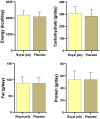Effects of the royal jelly consumption on post-stroke complications in patients with ischemic stroke: results of a randomized controlled trial
- PMID: 38260068
- PMCID: PMC10800663
- DOI: 10.3389/fnut.2023.1227414
Effects of the royal jelly consumption on post-stroke complications in patients with ischemic stroke: results of a randomized controlled trial
Abstract
Aims: There is a paucity of evidence regarding the benefit of royal jelly (RJ) on post-stroke complications in patients with ischemic stroke. To address this knowledge gap, this randomized, triple-blind, placebo-controlled clinical trial was carried out to determine the effects of RJ consumption on post-stroke clinical outcomes.
Methods: Of 64 eligible ischemic stroke patients (45-80 years), 32 were randomized to the RJ and 32 to the placebo groups and completed a 12-week intervention. The intervention group was advised to receive 1,000 mg of RJ dragee daily after breakfast. Post-stroke complications including cognition, fatigue, mental health, and appetite, along with serum levels of brain-derived neurotrophic factor (BDNF), and mid-upper arm circumference (MUAC) were assessed in groups pre-and post-intervention.
Results: After 12 weeks of RJ consumption, cognitive function [adjusted mean difference, 4.71; 95% confidence interval (CI), 1.75 to 7.67], serum levels of BDNF (adjusted mean difference, 0.36; 95% CI, 0.05 to 0.67), stress (adjusted mean difference, -3.33; 95% CI, -6.50 to -0.17), and appetite (adjusted mean difference, 1.38; 95% CI, 0.19 to 2.56) were significantly improved. However, the findings for fatigue (adjusted mean difference, -4.32; 95% CI, -10.28 to 1.63), depression (adjusted mean difference, -1.71; 95% CI, -5.58 to 2.16), anxiety (adjusted mean difference, -2.50; 95% CI, -5.50 to 0.49), and MUAC (adjusted mean difference, 0.36; 95% CI, -0.11 to 0.84) were less favorable.
Conclusion: Findings support the benefits of RJ consumption in improving post-stroke complications and clinical outcomes.Clinical trial registration: https://www.irct.ir/trial/59275, Identifier IRCT20180818040827N4.
Keywords: cognitive function; fatigue; ischemic stroke; mental health; royal jelly.
Copyright © 2024 Karimi, Arab, Sepidarkish, Khorvash, Saadatnia and Amani.
Conflict of interest statement
The authors declare that the research was conducted in the absence of any commercial or financial relationships that could be construed as a potential conflict of interest.
Figures
Similar articles
-
Royal Jelly: Biological Action and Health Benefits.Int J Mol Sci. 2024 May 30;25(11):6023. doi: 10.3390/ijms25116023. Int J Mol Sci. 2024. PMID: 38892209 Free PMC article. Review.
-
The effects of royal jelly supplementation on oxidative stress, inflammatory mediators, mental health, cognitive function, quality of life, and clinical outcomes of patients with ischemic stroke: study protocol for a randomized controlled trial.BMC Nutr. 2023 Feb 16;9(1):32. doi: 10.1186/s40795-023-00690-4. BMC Nutr. 2023. PMID: 36797768 Free PMC article.
-
Oral intake of royal jelly improves anti-cancer effects and suppresses adverse events of molecular targeted therapy by regulating TNF-α and TGF-β in renal cell carcinoma: A preliminary study based on a randomized double-blind clinical trial.Mol Clin Oncol. 2020 Oct;13(4):29. doi: 10.3892/mco.2020.2099. Epub 2020 Jul 20. Mol Clin Oncol. 2020. PMID: 32765876 Free PMC article.
-
Effect of Royal Jelly Intake on Serum Glucose, Apolipoprotein A-I (ApoA-I), Apolipoprotein B (ApoB) and ApoB/ApoA-I Ratios in Patients with Type 2 Diabetes: A Randomized, Double-Blind Clinical Trial Study.Can J Diabetes. 2016 Aug;40(4):324-8. doi: 10.1016/j.jcjd.2016.01.003. Epub 2016 Mar 22. Can J Diabetes. 2016. PMID: 27026221 Clinical Trial.
-
Royal jelly does not improve markers of glycemia: A systematic review and meta-analysis of Randomized Clinical Trials.Complement Ther Med. 2019 Jun;44:235-241. doi: 10.1016/j.ctim.2019.04.017. Epub 2019 Apr 24. Complement Ther Med. 2019. PMID: 31126561
Cited by
-
Royal Jelly: Biological Action and Health Benefits.Int J Mol Sci. 2024 May 30;25(11):6023. doi: 10.3390/ijms25116023. Int J Mol Sci. 2024. PMID: 38892209 Free PMC article. Review.
References
LinkOut - more resources
Full Text Sources
Miscellaneous



